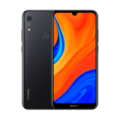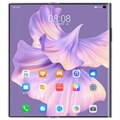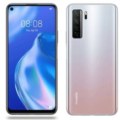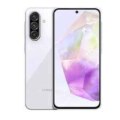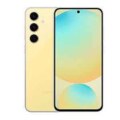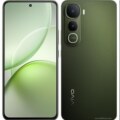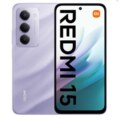ADVERTISEMENT
- Home
- Catalogue téléphone
- Smartphone Prix Algerie
- Huawei P40 Pro Plus
Huawei P40 Pro Plus
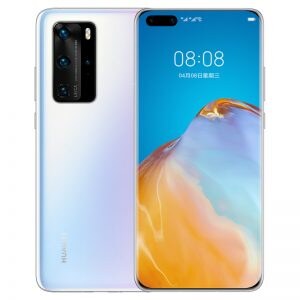
Fiche technique
Général
| Model | Huawei P40 Pro Plus |
| Annoncé | 26 mars, 2020 |
| Date de sortie | 23 mai, 2020 |
| Taille (diagonale) | 6,58 pouces, 105,2 cm 2 (~ 91,6% rapport écran / corps) |
| Résolution | 1200 x 2640 pixels, format 19,5: 9 OLED Taux de rafraîchissement HDR10 90 Hz |
| Densité de Pixels Pixel Density (PPI) is refers to the concentration of pixels on a particular display, measured in pixels per inch (ppi). Pixel density is calculated by dividing the diagonal pixel resolution of a display by its diagonal size, higher pixel density better display quality. | 441 ppi |
| Nombre de couleurs | 16 millions de couleurs |
Design
| Dimensions | 158,2 x 72,6 x 9 mm (6,23 x 2,86 x 0,35 pouces) |
| Poids | 226 g (6,17 oz) |
| Couleurs |
Céramique blanche, céramique noire |
| étanche |
Réseau
| Réseau 4G | 4G LTE (2100), 3(1800), 5(850), 7(2600), 8(900), 20(800) |
| Réseau 3G | 3G HSDPA 850 / 900 / 1900 / 2100 |
| Réseau 2G | 2G GSM 850 / 900 / 1800 / 1900 |
| GPRS GPRS (General Packet Radio Service) is a packet oriented mobile data service on the 2G and 3G cellular communication system's global system for mobile communications (GSM), Generally, GPRS is used for the purpose of wireless data transfer, such as sharing pictures and videos or browsing the Internet via a mobile phone connection. | |
| EDGE EDGE (Enhanced Data GSM Environment) is a wireless network technology generally considered the next step in the 2G network offers data transfer rates up to four times faster than ordinary GSM networks, Generally, EDGE is used for the purpose of wireless data transfer, such as sharing pictures and videos or browsing the Internet via a mobile phone connection. | |
| GPS GPS The Global Positioning System is a satellite-based radio navigation system, GPS permits users to determine their position, velocity and the time 24 hours a day, in all weather, anywhere in the world, In order to locate your position, your device or GPS receiver must have a clear view of the sky. | Oui, avec A-GPS bi-bande, GLONASS, BDS, GALILEO, QZSS, NavIC |
| SIM SIM (Subscriber Identity Module) is a small card that contains mobile network subscriber's account information. This allows the phone using the card to attach to a mobile network. The SIM card is most commonly associated with GSM and UMTS mobile networks. Moving a SIM card from one phone to another allows a subscriber to switch mobile phones without having to contact their mobile network carrier. SIM cards can also be used by a phone to store limited amounts of data, such as phone numbers and text messages. | Nano SIM |
| Dual SIM | Oui |
Media
| Sonneries | Polyphoniques |
| Lecteur MP3/AAC | MP3 / AAC / AAC+ |
| Radio FM | Non |
| Haut-Parleur | |
| Mains libres |
Caméra
| Appareil photo Camera is able to capture photographs and usually videos, The most important characteristics of a camera are the resolution (measured in megapixels), lens focus type (fixed or automatic), higher megapixel cameras are known to capture higher quality photos, but not always a good measurement of the photos quality. | 50 MP, f / 1,9, 23 mm (large), 1 / 1,28 ", 2,44 µm, PDAF omnidirectionnel, OIS 8 MP, f / 4,4, 240 mm (téléobjectif périscope), PDAF, OIS, zoom optique 10x 8 MP, f / 2,4 , 80 mm (téléobjectif), PDAF, OIS, zoom optique 3x 40 MP, f / 1,8, 18 mm (ultra large), 1 / 1,54 ", PDAF TOF 3D, (profondeur) |
| Appareil photo avant | 32 MP, f / 2.0, 26 mm (large), 1 / 2,8 ", 0,8 µm IR TOF 3D, (capteur biométrique uniquement) |
| Video | 4K @ 30 / 60fps, 1080p @ 30 / 60fps, 720 @ 7680fps, 1080p @ 960fps, HDR; gyro-EIS |
Logiciel
| Systèmes d'exploitation OS => Every computer system run on a base software called Operating System (OS). Operating System controls all basic operations of the computer (such as smartphone, PDAs, tablet computers and other handheld devices). The Operating System allows the user to install and run third party applications (apps), apps are used to add new functionality to the device. | Android 10, pas de services Google Play |
| Interface UI or user interface of a device is the look and feel of the on-screen menu system. How it works, its color scheme, how it responds to button presses, all of these things are part of the user interface. | EMUI 10.1 |
| Prix | 1200 EURO |
Hardware
| Processeur CPU (Central Processing Unit) mostly known as processors, CPU processes instructions in order to carry out certain functions that make your device operate properly. Processors are often described as the brain of computers, smartphones and tablets, Smartphones and tablets rely on processors to carry out their every task, Processors are an incredibly important factor in selecting any type of computing device, including your smartphone. | Kirin 990 5G (7 nm) Octa-core (Cortex-A76 2x2,86 GHz et Cortex-A76 2x2,36 GHz et Cortex-A55 4x1,95 GHz) |
| GPU GPU (Graphics Processing Unit) is a single-chip processor designed to rapidly manipulate and alter memory to accelerate the creation of images in a frame buffer intended for output to a display, This includes things such as lighting effects, object transformations, and 3D motion. | Mali-G76 MP16 |
| RAM (Memoire) RAM (Random Access Memory) is a type of computer memory that can be accessed randomly, any byte of memory can be accessed without touching the preceding bytes that allows information to be stored and accessed quickly from random locations. RAM is the most common type of memory found in computer systems, smartphones, tablets and other electronic devices. | 8 GB |
| Memoire interne Internal Storage is a data storage space (flash memory) mostly used in smartphones, tablets and other electronic devices where operating system, apps, music, photos, videos, files and other user data Is stored. | 256 / 512 GB UFS 3.0 |
| Carte MicroSD Memory Card Slot is a special slot for inserting a memory card. Memory cards allow you to expand the phone's built-in memory, A memory card (sometimes called a flash memory card or a storage card) is a small storage medium used to store data such as text, pictures, audio, and video, for use on small, portable or remote computing devices such as mobile phones, mp3 players, digital cameras. | Oui, 256 Go |
| Type de batterie Battery Type => Cell phones run on various kinds of batteries depending on the manufacturer, phone size or shape and features. There are basically four types of cell phone batteries => Lithium Polymer, Lithium Ion, Nickel Metal Hydride and Nickel Cadmium. | Li-Poly (Lithium Polymer) |
| Autonomie de batterie | 4200 mAh non amovible |
| Capteurs Sensors are electronic components that detects and responds to some type of input from the physical environment. The specific input could be light, heat, motion, moisture, pressure and location, The output is generally a signal that is converted to use in computing systems, a location sensor, such as a GPS receiver is able to detect current location of your electronic device. |
Reconnaissance faciale infrarouge, empreinte digitale (sous écran, optique), accéléromètre, gyroscope, proximité, boussole, spectre de couleurs Charge rapide 40W Charge sans fil rapide 27W Charge sans fil inverse rapide 27W |
Connectivité
| Bluetooth Bluetooth is a wireless communications technology for exchanging data between mobile phones, headsets, computers and other network devices over short distances without wires, Bluetooth technology was primarily designed to support simple wireless networking of personal consumer devices. | 5.1, A2DP, LE |
| Infrarouge Infrared connectivity is an old wireless technology used to connect two electronic devices. It uses a beam of infrared light to transmit information and so requires direct line of sight and operates only at close range. | |
| Wi-fi Wi-Fi is a popular wireless networking technology using radio waves to provide high-speed network connections that allows devices to communicate without cords or cables, Wi-Fi is increasingly becoming the preferred mode of internet connectivity all over the world. | Wi-Fi 802.11 b / g / n, WiFi Direct, point d'accès sans fil |
| USB | Type-C 3.0 |
| NFC NFC (Near field communication) is a set of standards for smartphones and similar devices to establish peer-to-peer radio communications with each other by touching them together or bringing them into proximity, usually no more than a few inches. | |
| HDMI HDMI (High-Definition Multimedia Interface) is a compact audio/video interface for transferring uncompressed video data and compressed or uncompressed digital audio data from a HDMI-compliant source device to a compatible computer monitor, video projector, digital television, or digital audio device. | |
| Recharge sans fil Wireless Charging (Inductive Charging) uses an electromagnetic field to transfer energy between two objects. This is usually done with a charging station. Energy is sent through an inductive coupling to an electrical device, which can then use that energy to charge batteries or run the device. | Oui |
| Lecteur empreinte digitale | |
| Prise microphone | |
| Prise Jack 3,5 mm |
Fiche Technique Huawei P40 Pro Plus : Ecran 6,58 pouces Android 10 256Go disque 8 Go RAM 3G 4G / APN 32 MP / 50 MP Batterie 4200 mAh.
Huawei P40 Pro Plus – Fiche technique
Général
| Model | Huawei P40 Pro Plus |
| Annoncé | 26 mars, 2020 |
| Date de sortie | 25 avril, 2020 |
| Taille (diagonale) | 6,1 pouces, 104,2 cm 2 (~ 84,7% rapport écran / corps) |
| Résolution | 1080 x 2350 pixels, format 19,5: 9 OLED |
| Densité de Pixels | 422 ppi |
| Nombre de couleurs | 16 millions de couleurs |
Design
| Dimensions | 148,9 x 71,1 x 8,5 mm (5,86 x 2,80 x 0,33 pouces) |
| Poids | 175 g (6,17 oz) |
| Couleurs | Silver Frost, Blush Gold, Deep Sea Blue, Ice White, Black |
| étanche |
Réseau
| Réseau 4G | 4G LTE (2100), 3(1800), 5(850), 7(2600), 8(900), 20(800) |
| Réseau 3G | 3G HSDPA 850 / 900 / 1900 / 2100 |
| Réseau 2G | 2G GSM 850 / 900 / 1800 / 1900 |
| GPRS | |
| EDGE | |
| GPS | Oui, avec A-GPS bi-bande, GLONASS, BDS, GALILEO, QZSS, NavIC |
| SIM | Nano SIM |
| Dual SIM | Oui |
Media
| Sonneries | Polyphoniques |
| Lecteur MP3/AAC | MP3 / AAC / AAC+ |
| Radio FM | Non |
| Haut-Parleur | |
| Mains libres |
Caméra
| Appareil photo | 50 MP, f / 1,9, 23 mm (large), 1 / 1,28 « , 2,44 µm, PDAF omnidirectionnel, OIS 8 MP, f / 2,4, 80 mm (téléobjectif), PDAF, OIS, zoom optique 3x 16 MP, f / 2,2, 17 mm (ultra large), AF |
| Appareil photo avant | 32 MP, f / 2.0, 26 mm (large), 1 / 2,8 « , 0,8 µm IR TOF 3D, (capteur biométrique uniquement) |
| Video | 4K @ 30 / 60fps, 1080p @ 30fps, 720p @ 960fps, (gyro-EIS) |
Logiciel
| Systèmes d’exploitation | Android 10, pas de services Google Play |
| Interface | EMUI 10.1 |
| Prix | 749 EURO |
Hardware
| Processeur | Kirin 990 5G (7 nm) Octa-core (Cortex-A76 2×2,86 GHz et Cortex-A76 2×2,36 GHz et Cortex-A55 4×1,95 GHz) |
| GPU | Mali-G76 MP16 |
| RAM (Memoire) | 6 / 8 GB |
| Memoire interne | 128 / 256 GB UFS 3.0 |
| Carte MicroSD | Oui, 128 Go |
| Type de batterie | Li-Poly (Lithium Polymer) |
| Autonomie de batterie | 3800 mAh non amovible |
| Capteurs | Reconnaissance faciale infrarouge, empreinte digitale (sous écran, optique), accéléromètre, gyroscope, proximité, boussole, spectre de couleurs Charge rapide 22,5 W |
Connectivité
| Bluetooth | 5.1, A2DP, LE |
| Infrarouge | |
| Wi-fi | Wi-Fi 802.11 b / g / n, WiFi Direct, point d’accès sans fil |
| USB | Type-C 3.0 |
| NFC | |
| HDMI | |
| Recharge sans fil | Non |
| Lecteur empreinte digitale | |
| Prise microphone | |
| Prise Jack 3,5 mm |
Avis
Acheter
-
 Honor Play Smartphone débloqué 4G (Ecran : 6,3 pouces - 64 Go - Double Nano-SIM - Android) Noir [Version française]
€299,00
Honor Play Smartphone débloqué 4G (Ecran : 6,3 pouces - 64 Go - Double Nano-SIM - Android) Noir [Version française]
€299,00
Afficher l'offre -
 Honor Play Smartphone débloqué 4G (Ecran : 6,3 pouces - 64 Go - Double Nano-SIM - Android) Bleu [Version française]
€299,00
Honor Play Smartphone débloqué 4G (Ecran : 6,3 pouces - 64 Go - Double Nano-SIM - Android) Bleu [Version française]
€299,00
Afficher l'offre -
 【3 Pièces】Huawei Honor Play Verre Trempé【Garantie à Vie】, ANEWSIR Film Protection en Verre trempé écran Protecteur 9H, Anti Rayures, Adsorption Automatique, Sans Bulles - Pour Huawei Honor Play (6.3 pouces)
€7,99
【3 Pièces】Huawei Honor Play Verre Trempé【Garantie à Vie】, ANEWSIR Film Protection en Verre trempé écran Protecteur 9H, Anti Rayures, Adsorption Automatique, Sans Bulles - Pour Huawei Honor Play (6.3 pouces)
€7,99
Afficher l'offre -
 Huawei Mate 20 Lite
€378,45
Huawei Mate 20 Lite
€378,45
Afficher l'offre
Disclaimer Note
Clause de non-responsabilité. Nous ne pouvons pas garantir que les informations sur cette page sont correctes à 100%.



